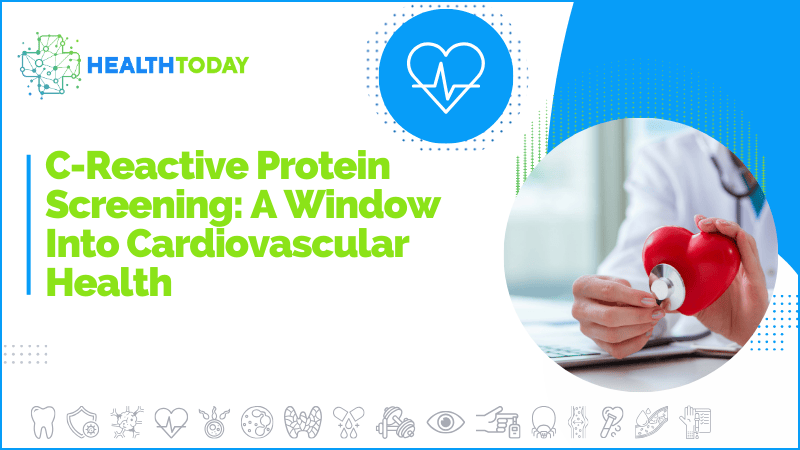
Early detection of potential impacts to cardiovascular health is crucial for effective prevention and treatment. One valuable tool in assessing cardiovascular health is the Mayo Clinic’s C-Reactive Protein (CRP) screening. This blood test measures the level of CRP, a protein produced by the liver in response to inflammation in the body. Elevated levels of CRP have been linked to an increased risk of cardiovascular disease, making CRP screening a valuable diagnostic tool. Let’s explore the purpose of the test, its procedure, and how the results can guide further diagnostic testing and treatment decisions. Understanding the significance of CRP screening can empower individuals to take proactive steps towards protecting their cardiovascular well-being.
Cardiovascular disease remains a leading cause of mortality worldwide, highlighting the importance of effective screening tools for early detection and prevention. The C-Reactive Protein (CRP) screening is one such tool that provides valuable insights into cardiovascular health. This blood test measures the level of CRP, a protein produced by the liver in response to inflammation in the body. By assessing the CRP level, healthcare professionals can gauge the presence and extent of inflammation, which is closely linked to the development and progression of cardiovascular disease.
Why Does Inflammation Matter?
Inflammation plays a critical role in the development of atherosclerosis, a condition characterized by the buildup of plaque in the arteries. When blood vessels become inflamed, they undergo structural changes that facilitate the deposition of fatty substances. Over time, these substances form plaques that can obstruct blood flow, leading to various cardiovascular conditions, such as heart attacks and strokes. By measuring CRP levels, the screening provides an indirect measure of the inflammatory activity within the body, helping identify individuals at an increased risk of developing cardiovascular disease.
How Is CRP Screening Performed?
The CRP screening is typically performed using a blood sample, obtained through a simple and non-invasive procedure. Once the sample is collected, it is sent to the Mayo Clinic lab for analysis. Results allow health care professionals to promptly interpret and utilize them to guide further diagnostic testing and treatment decisions. Elevated CRP levels can indicate the presence of inflammation, necessitating a comprehensive evaluation of the individual's cardiovascular health. Conversely, normal or low CRP levels can provide reassurance and indicate a lower risk of cardiovascular disease.
Why Is CRP SCreening So Valuable?
The C-Reactive Protein screening serves multiple purposes in the realm of cardiovascular health. Firstly, it aids in the diagnosis and monitoring of conditions that cause inflammation, such as infection and autoimmune diseases. By identifying the underlying causes of inflammation, health care professionals can target the specific condition and develop appropriate treatment plans. Secondly, C-Reactive Protein screening acts as an essential tool in identifying individuals at an increased risk of cardiovascular disease. Elevated CRP levels can serve as an early warning sign, prompting healthcare professionals to implement preventive measures and closely monitor the individual's cardiovascular health.
It is important to note that while the CRP screening provides valuable information about cardiovascular health, it is not a definitive diagnostic tool. Elevated CRP levels do not directly indicate the presence of cardiovascular disease but rather signal an increased risk. Therefore, further diagnostic testing, such as imaging studies or stress tests, may be necessary to confirm the presence of cardiovascular disease.
Click here to view a sample of the CRP screening report
C-Reactive Protein (CRP)
The Mayo Clinic C-Reactive Protein (CRP) screening is a valuable tool in assessing cardiovascular health. By measuring the level of CRP in the blood, healthcare professionals can evaluate the presence and extent of inflammation, which is closely linked to the development and progression of cardiovascular disease. The screening aids in diagnosing and monitoring conditions that cause inflammation and provides an indication of an individual's risk for cardiovascular disease. By utilizing the results of the CRP screening, healthcare professionals can guide further diagnostic testing and treatment decisions, empowering individuals to take proactive steps
Health Today is a multi-disciplinary clinic designed to deliver competent, convenient access to health and wellness services in a timely fashion. We are committed to empowering our community to take control of their own comprehensive health and wellness by making access to the best resources for prevention, diagnosis, and care easy and affordable. If you have any questions regarding the advanced private lab tests available, connect with our Health Today team today. To book your CRP screening or any other private lab services read our booking instructions and then book your advanced lab services.
Adopting a healthy lifestyle is key. Regular exercise, a balanced diet rich in fruits and vegetables, maintaining a healthy weight, managing stress levels, and avoiding smoking can help reduce inflammation and lower CRP levels. It's also important to follow medical advice, such as taking prescribed medications and managing underlying conditions like diabetes and hypertension. Always consult with a health care professional for personalized guidance.
While the CRP screening cannot directly diagnose cardiovascular disease, it provides valuable insights into an individual's risk. Elevated CRP levels indicate increased inflammation and suggest a higher likelihood of developing cardiovascular problems, prompting further diagnostic testing for confirmation.
Inflammation plays a pivotal role in the development of cardiovascular disease. Chronic inflammation can lead to structural changes in blood vessels, promoting the buildup of plaque and increasing the risk of conditions such as heart attacks and strokes.